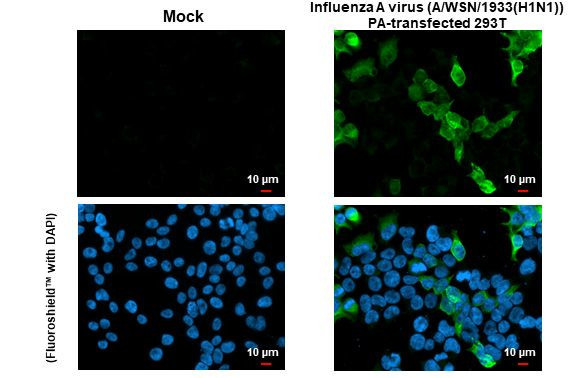Search Thermo Fisher Scientific
Invitrogen
Influenza A PA (A/WSN/1933) Recombinant Rabbit Monoclonal Antibody (HL1388)
FIGURE: 1 / 3
Influenza A PA (A/WSN/1933) Antibody (MA5-47024) in ICC/IF



Product Details
MA5-47024
Species Reactivity
Host/Isotype
Expression System
Class
Type
Clone
Immunogen
Conjugate
Form
Concentration
Purification
Storage buffer
Contains
Storage conditions
Shipping conditions
RRID
Product Specific Information
Store as concentrated solution.
Centrifuge briefly prior to opening vial.
Target Information
Influenza viruses consists of three types (Influenza A, B, and C), which make up three of the five genera in the Orthomyxoviridae family. Commonly know as the flu, influenza strains can affect both birds and mammals. Influenza strains form roughly spherical particles and are similar in composition with viral envelope containing two main types of glycoproteins (hemagglutinin and neuraminidase), wrapped around the central core of the viral RNA genome and other viral proteins that package and protect the RNA. Unusually for a virus, the influenzavirus genome is not a single piece of nucleic acid; rather a seven to eight segmented fragments of negative-sense RNA with each fragment expressing different viral proteins. Influenza spreads seasonally, resulting in about three to five million yearly cases of severe illness and about 250,000 to 500,000 deaths annually or into the millions in pandemic years. Influenza A virus contains eight single stranded, negative sense RNAs. Each RNA is associated with viral RNA-dependent RNA polymerase which consists of PA, PB1 and PB2 proteins. Recent reports indicate the involvement of PA in 'cap-snatching' mechanism via its endonuclease activity which is essential for cRNA-dependent viral RNA synthesis.
For Research Use Only. Not for use in diagnostic procedures. Not for resale without express authorization.
References (0)
Bioinformatics
Protein Aliases: Influenza PA

Performance Guarantee
If an Invitrogen™ antibody doesn't perform as described on our website or datasheet,we'll replace the product at no cost to you, or provide you with a credit for a future purchase.*
Learn more
We're here to help
Get expert recommendations for common problems or connect directly with an on staff expert for technical assistance related to applications, equipment and general product use.
Contact tech support
